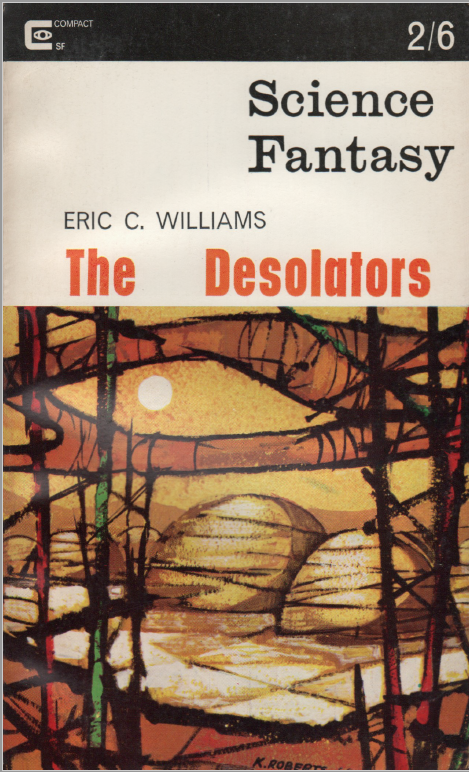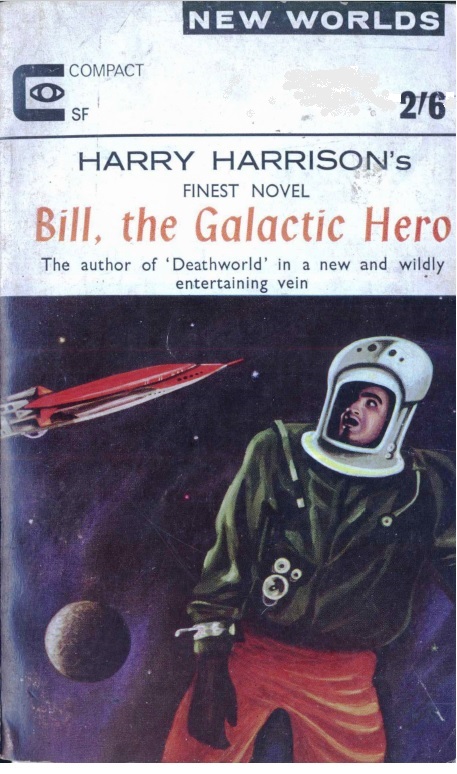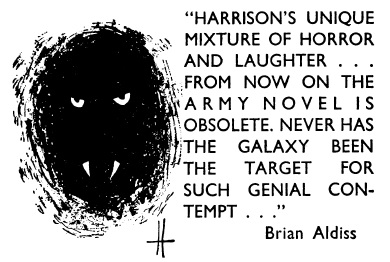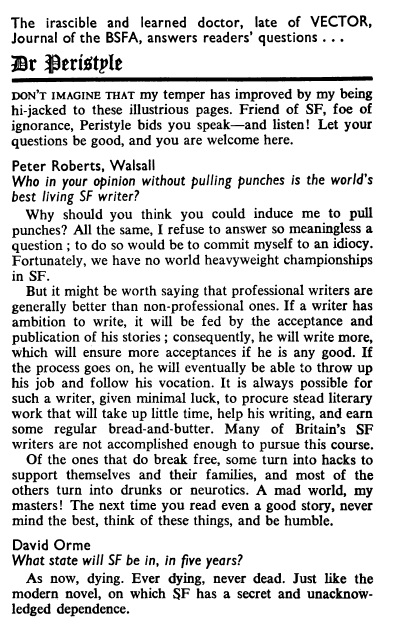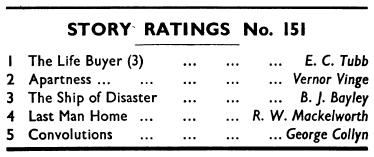
by Mark Yon
Scenes from England
Hello again!
The issue that arrived first in the post this month was Science Fantasy..

However, the incredibly cheap looking cover did not bode well. I reckon the thankfully-unnamed artist put this together at the end of a spare five minutes. But it is in colour.
This month’s Editorial, like that in New Worlds, is a report on the Worldcon held in London in August. Such is the delay in publishing. Perhaps this is what absentee-editor Kyril has been working on over his two months of absence?
As you might perhaps expect for such a prestigious event – it is only the second time that the Worldcon has been held in England, after all – the comments are generally positive. What is interesting about Kyril’s report is that not having attended one before he is seeing the event with fresh eyes. It is also interesting that much of what happens is not the Worldcon itself – Kyril’s mention of a meeting in Oxford with the likes of Messers. Aldiss, Ballard, Blish and Harrison made me quite envious. Oh, to be a fly on the wall there!
It is clear that such social gatherings have paid off- not only is there going to be an “all-star issue” in the near future, expect more writing from Judith Merrill in both Science Fantasy and New Worlds. Think of that as an early Christmas present.
Kyril’s also been persuaded to have a change of heart and include story ratings, although it must be said in a different way to New Worlds. Here are the ratings for Issue 76 (September 1965) and 77 (October 1965):

To the actual stories.
Plague from Space , by Harry Harrison
And where to start the gap left by Burnett Swann’s serial finishing last month? With another serial, this time from Harry Harrison.
I must admit that I was a little wary, having being underwhelmed by Harry’s most recent serial, that of Bill, the Galactic Hero in New Worlds. This one seems to tread on ground less satirical and more like Harry’s recent novel, Deathworld, which is even referenced in the serial’s banner heading.
A typical science-fiction catastrophe story, it is perhaps unusual to be the lead story in Science Fantasy. Whilst it is entertaining enough – and I found it to be more interesting than the tale of ol’ Bill – it’s sf for the masses, a story that wouldn’t be amiss in a Hammer horror movie. Anyone who remembers the Quatermass television series and movies will know what they’re getting here. It is easy to read and undeniably well-written, but I can see why it is in Science Fantasy and not New Worlds. New Worlds is rapidly outgrowing such dated material. 4 out of 5.
As Others See Us, by E. C. Tubb
Another regular veteran of both magazines, last seen in the October 1965 issue with State of Mind. This is the story of Mark, who on finding a strange object in the sea, puts it on to wear and finds that it gives him the power of telepathy. The author clearly tries to be lyrical in the telling of the tale, and there’s a lot of introverted navel-gazing at the beginning about the sea, counterpointed by an almost Lovecraftian, weak ending as Mark returns to the sea. 3 out of 5.
A Question of Culture, by Richard A. Gordon
And this is also the return of someone we read last month, with Time’s Fool in New Worlds. Now with an added ‘A’ (presumably to avoid confusion with the more famous writer of the non-genre Doctor books), Richard’s story this month is about a future where men have to have a yearly examination about ‘Kulture’ at the offices of the Aesthetics Council in the National Gallery. Being tested on music, art and literature has dire consequences should Mr. Henry Shepherd fail – a visit to the Cultural Realignment Centre. There’s a point in there about what negative impact the forcing of culture could have upon the general public, and an impressive diatribe from Henry to illustrate the point. I found the thought of the National Gallery being used as some sort of examination centre a little amusing, but overall, it’s an extrapolation taken to rather silly extremes. 3 out of 5.
Democratic Autocracy, by Ernest Hill
Another veteran. This story is a political one. Child Manaton is Minister of Health in some future state in the 41st century, the man entrusted with ‘Eradication’ – a simple, hygienic way of disposing of those who are old or crippled or unable to provide a service to the State. He takes to his work enthusiastically, embodying Jeremy Bentham’s ideas of population control for the greater good, but has a personal crisis when his mistress Lilith finds herself genito-revulsive and therefore a candidate for Eradication. Rather than send her to the Cylinder for execution, Manaton persuades scientists to look for a cure for Lilith instead. The public, realising the unfairness of it all, revolt (Democratic Autocracy, see?), which has consequences for Manaton and Lilith. The story reads well enough, although it has a tendency to over-sell its own importance. 3 out of 5.
Cleaner than Clean, by R. W. Mackelworth
A story about a man working for the Public Works Department, who has to deal with what seems to be a light-hearted protest about some man’s drains, but which eventually leads to events which are more sinister. The cause of this issue is (believe it or not) a ‘secret ingredient’ in a new brand of washing detergent. It is an unusual style for Mackelworth, whose material tends to deal with more weighty matters. This one wobbles between humour and horror and finishes weakly. In the end, this is inconsequential stuff. 3 out of 5.
Passenger, by Alan Burns
We’ve met Alan Burns before, with the strange story of Housel (in the May 1965 issue). This one is just as strange, but poorly executed. Rankin ‘Rank’ Quayle meets friend and work colleague Cilla O Dare (nicknamed ‘Killer’ – the second story this month with such a nickname) before setting on a caper. It sounds a little like a traditional crime story, but as this is science fiction, Killer is a ‘sensitive’, with telepathic powers and Rank is the muscle guy.
Together they work for Handley, hunting shapeshifting aliens. When they go to meet Handley at his workplace, Killer faints, thus clearly foretelling that nasty things are happening at Handley’s factory. The twist in the story is that – gasp- Killer is not who she appears to be and is actually a human being used to transport an alien in their body, as is Handley, who is really an alien leader. In order to save O Dare, Quayle agrees to transfer the alien from her to himself, but in the end betrays them and foils an alien invasion.
Even if that precis didn’t make you squirm, the story is a mess, filled with errors and poor punctuation, as well as long stretches of exposition that do little to keep the reader engaged. It all reads as bad space opera of the “one bound and he was free” type that we left long ago. I thought that as a new writer Burns had potential with Housel, but it seems he may have reached his peak already. 2 out of 5.
Summing up Science Fantasy
This is an issue that plays safe – lots of the regular writers from the British magazines, producing fairly typical and totally expected material. Even the serial story panders to the predictable. It’s a reasonable issue, with some variety, but there’s nothing here that I found particularly memorable. Overall, it feels like a half-hearted effort by Kyril, just back off his holiday. When the most interesting read is the Editorial, it doesn’t exactly sell itself to me.
The Second Issue At Hand

After an uninspiring Science Fantasy issue, I was hoping for better with the arrival of New Worlds. However, the cover seems to be an inferior attempt to replicate Jackson Pollock’s abstract expressionism – and whilst refusing to call it “a load of Pollocks”, it hardly makes me want to pick up and read the magazine. It makes me think I’ve spilt something on the cover! But I’ll try and be nice – at least, as with the Science Fantasy, it is in colour.
Like Kyril’s efforts, this month’s editorial from Mike Moorcock praises Worldcon and adds a few more gossipy details to Kyril’s version of events. There was what sounds like an interesting ‘discussion’ on one of the panels between John W Campbell and John Brunner about politics in science fiction, with Campbell doing what he seems to do and taking a view designed to stir up debate – in this case, that slavery is acceptable as a reasonable system of government in science fiction. It does sound like it was fun!
Secondly, Moorcock heralds the arrival of the second issue of a new critical magazine, Science Fiction Horizons, which is so positive that it reads as if Moorcock would rather be there than here – to quote, “SF Horizons [is] still the most stimulating magazine of its kind ever to appear in the sf world.” But then that might be just because there is an interview with William Burroughs in the issue, someone who Moorcock clearly rates as an influence.

To the stories!
The Wrecks of Time (Part 2 of 3)), by James Colvin
Straight into the second part of this entertaining serial. If you remember from last time, this was a story of multiple Earths with a rambunctious hero by the name of Professor Faustaff. With his faithful assistants, Faustaff takes on his nemesis Herr Steifflomeis and the nefarious D-Squad, who for reasons initially unknown seem determined to attack Faustaff’s teams and cause chaos, destroying alternate Earths by creating Unstable Matter Situations (UMSs).
This time, Faustaff begins by being held at gunpoint by Steifflomeis and then held captive by a new adversary, Cardinal Orelli, who appears in a helicopter and takes Faustaff and Steifflomeis away to his camp. Upon taking Faustaff we discover two things – that Orelli has a disruptor weapon that he is clearly not afraid to use and, secondly, two of the D-Men is some form of suspended animation from which Orelli cannot wake them. They travel with the D-Squaders to Earth-4, where Orelli’s headquarters is in a deserted Gothic style church. With the laboratory equipment there it is hoped that Faustaff can revive the D-men, although he actually finds in a shock revelation that they are robots, the creation of some race from beyond the multiple Earths.
Suddenly Faustaff ends up back at his base on Earth One and is reunited with his team. They tell him that a new Earth – called hereafter Earth-Zero – is currently being created by an unknown intelligence. An expedition to destroy Orelli’s headquarters on E4 is organised, but at the same time a crisis has developed on E1 that develops into a War between East and West. Faustaff meets again the oddly emotionless Maggy White from E3, who tries to persuade him to give up his actions and explains some of the bigger picture.
When nuclear war is declared, Faustaff, his colleagues Gordon Ogg, Doctor May and John Mahon and his friend Nancy Hunt travel to E3, from where they hope to gain access to E-Zero and set up a new headquarters there. Lots of things then seem to happen quickly. Multiple Earths are destroyed. Orelli reappears in a base on E3 and Faustaff and his colleagues go to meet him again. Steifflomeis also then reappears. All of them are then transported together to Earth Zero for another sudden ending.
Gun-toting Cardinals, emotionless femme-fatales and snarling adversaries, this serial is still a lot of fast-paced fun. However, as much as I enjoyed this, I didn’t enjoy it quite as much as last month. The general impression is that there’s a lot of running about and the latter part of the story in particular is very talkative, with Faustaff seemingly spending much of it speaking to other characters. There’s a lot of enthusiasm here, but in the end it all felt a bit-one note and consequently quite wearying by the end with its relentless energy. It is very much a middle part of a story, with little resolved. Anyone wandering into this part having not read the first may be rather confused by what is going on, although I suspect that that is partly the point. However, lots of running around and incessant talking makes this 3 out of 5.
Transient, by Langdon Jones
For the second time in two months the second story of the issue is by Moorcock’s second-in-command. (There’s some weird numerology thing going on there…) I liked last month’s story overall, but I think this month’s titular tale is better.
The start of the story is about a man who seems to die but then wakes up in a hospital wondering where he is.
Actually… we discover that the narrator is not a man but a chimpanzee who has had his consciousness raised to the level of a man, so much so that he is able to hold a conversation with his Doctor. Immediately this made me think of Daniel Keyes’ excellent A Flower for Algernon, but the difference here is that the chimpanzee understands that he is going to begin to lose his uplifted abilities after two hours, and his knowing that he is losing his faculties in a few pages is both terrifying and very sad. Good as Transient is, it is sub-Keyes in quality. 4 out of 5.
J Is for Jeanne, by E. C. Tubb
The second story from this regular veteran this month. It’s been a while since we’ve had an author in both issues in a month, isn’t it? This one is different in style from As Others See Us, as it begins with Jeanne (of the title) telling of a repeating nightmare she has to Paul. They go to see Carl, who seems to be a psychologist. There’s lots of discussion of different types of psychological theory to suggest what the dream might be about – the author has clearly done to some research and wishes the reader to know that! – before the reason for this dream is revealed. It is a twist in the ending that’s not really original but I suspect one that Philip K Dick would like. I was less impressed. 3 out of 5.

A grumpy Jerry Cornelius. Illustration by Douthwaite
Further Information, by Michael Moorcock
This is another – the second – in Moorcock’s now seemingly ongoing series of Jerry Cornelius stories, who we first met back in the August 1965 issue with Preliminary Information. And as seems to be the norm now, we are dropped into the story without any knowledge of characters or what is going on. Cornelius, with his assistant Miss Brunner and some others, arrive at a house that used to belong to Jerry’s father (‘Old Cornelius’) but is now owned by his brother Frank. Jerry wants some secret microfilm in the house’s cellar, but Frank does not seem happy to see Jerry, as their attempt to enter the house involve all manner of weapons being exchanged, including hallucinogenic gas, needle guns and nerve bombs, with the expected results. Jerry also tries to retrieve Catherine, but is less successful. It’s all rather frantic and even mystifying but I suspect that that is the point. If readers didn’t realise before now, then the similarity in writing between this story and Colvin’s serial seems pretty obvious to me here.
As enjoyable as this was, putting two similar stories together in one issue may either be too much of a good thing or reflect a hint of desperation to fill the pages on the Editor’s part. 3 out of 5.
Dance of the Cats, by Joseph Green
In the January 1965 issue of New Worlds Joseph introduced us to Silva de Fonseca and Aaron Gunderson, two film makers who travel to different planets to record anthropological customs and culture. This time they are to travel to Epsilon Eridani Two, where they hope to record a legendary dance performed by the cat-like residents known throughout the galaxy. There’s a story to be told of dominant sexy cat-leaders and telepathic subservient dogs here – yes, it really is a story of cats and dogs! – which has a surprisingly dark element to it. The hypnotic element of the dance being recorded leads to Aaron joining in a mass orgy, which afterwards he shamefully feels could be seen as rape. There’s also a sub-plot involving the attempted abduction of the dance troupe by playboy Danyel Burkhalter, who hopes to force them to join his father’s circus. A story that tries to mix light-hearted humour with weightier themes, which although well-written, doesn’t quite succeed for me. 3 out of 5.

Illustration by James Cawthorn, which sums up the story quite nicely!
To Possess in Reality, by David Newton
This is a story that begins like a fantasy story, with princes, princesses and unicorns, but then takes a sudden left turn into science fiction with the arrival of Xavier, a starship pilot and salvager. Upon Xavier’s leaving of Fairyland, through use of the macrocosmic Hyperdrive, he inadvertently takes with him a lovestruck Prince and a virginal Princess and returns to Earth, which is a war zone. A visit afterwards to the inevitable Company Psychotelepath leads to a decision that needs to made by Xavier. One of the wackiest stories I’ve recently read, but quite good fun in its send-up of Fantasy themes. 3 out of 5.
A Mind of my Own, by Robert Cheetham
This is a menage a trois tale, the story of what happens when a strapping young half on an expeditionary pair named Mike meets and falls in love with young Juline. The complication is that Mike’s other half of the pair is a telepathic Sensitive who falls in love with Juline as well. Short yet competent. 3 out of 5.
Ernie, by Colin R. Fry
A story of an unnamed rocketman on Mars who gambles in a casino, loses all his money and then is offered a job as an overseer in an etherium mine on the Moon. The work is tough and violent. He meets Pete and Ernie, two of a group of mutant dwarves (yes, really!) working in the mines. It is dangerous work, and Ernie is involved in an accident which blinds him. As a result, the storyteller has to sack Ernie, albeit reluctantly as he can no longer work in the mines. Ernie, led by Pete, manages to escape the mine, which leads to strike action and a knife-fight between some of the miners. The ending is abrupt and rather unconvincing. I was left wondering what the actual point of this story was. Is it a story designed to shock? (It didn’t.) Was it to bring to light the point that in the future slave mines may exist, even on the moon? If so, it is a point emphasised rather bluntly – it is said, for example, that the unnamed lead character is not averse to using a whip, if he has to. But it all seems a bit depressing and pointless to me. 2 out of 5.
Book Reviews, Peristyle and Letters
This month’s Book Reviews may be lacking in the breadth of last month’s reviews, but we do have some depth. Langdon Jones gives a more-than-three-pages review of Ray Bradbury’s Dandelion Wine. Daring to go against the opinion of his Editor-in-chief, Mike Moorcock, Langdon Jones likes it a lot, going so far as to say that it is one of Bradbury’s best. Sentimental, admittedly, and steeped in nostalgia, but “a curiously heady brew” of connected short stories.
There is a briefer review by R. M. Bennett of Eric Frank Russell’s story collection, Somewhere A Voice, which is praised for its versatility and that it is generally an above average collection, although the reviewer is left with a feeling that the author can do better.
Onto Dr. Peristyle (Brian Aldiss) this month. It’s quite short, but brilliantly acerbic. I like these retorts to the science fiction community, but I’m not entirely sure Dr. Peristyle’s sojourn from the pages of the BSFA journal have been entirely successful here. Nevertheless, this month has intriguing responses to questions such as: “Do you believe a science fiction convention advances the cause of science fiction?”

In the letters pages there is comment made on the dichotomy created by Brian Aldiss’s writing (does the respondent know about Dr. Peristyle, I wonder?), a congratulatory agreement for the attempt to broaden the science fiction genre, and praise for Harry Harrison’s recent serial, Bill the Galactic Hero, which you may know that I disagreed with.
Summing up New Worlds
An issue of highs and lows. Langdon Jones’s story is memorable but based around an old theme, whilst the Colvin/Moorcock tale is surprisingly less impressive – I am starting to feel that this is one of those stories that starts with a great idea but fails to reach its potential. Moorcock’s other story was interesting, but too similar to the Colvin for me to fully enjoy it. Joseph Green’s tale was marvellously silly, but the rest are determinedly unmemorable. The predominance of Moorcock’s writings should have meant that I liked the issue more than I did, but I remain curiously unmoved on the whole.

Summing up overall
Well, I wasn’t expecting to say this month that not just one but both issues reviewed are surprisingly rather disappointing. There’s nothing really wrong with them, but I feel rather deflated after reading them. This may be that the Editors were too busy at the Worldcon to spend as much time on the issues as they normally do, or there’s something else amiss behind the scenes. But neither issue is a winner this month, frankly. If I had to pick ‘a winner’, it probably would be New Worlds – but only just.
Now that you have celebrated that event known as Thanksgiving (and we have had Bonfire Night here in Britain), we’re now on the countdown to Christmas. The shops are open, and the trees are blazing with light… I’m starting to get quite excited (albeit in that typically understated British manner!) and New Worlds are trying to make me spend money in the nicest possible way:

Until the next…

![[November 26, 1965] Plagues and Unicorns <i>Science Fantasy</i> and <i>New Worlds</i>, December 1965](https://galacticjourney.org/wp-content/uploads/2020/11/Sciene-Fantasy-NW-December-1965-672x372.jpg)

![[July 28, 1965] Aldiss, Harrison, and Roberts, Inc. (August 1965 <i>Science Fantasy</i> and <i>New Worlds</i>)](https://galacticjourney.org/wp-content/uploads/2020/07/650728cover-672x372.jpg)

